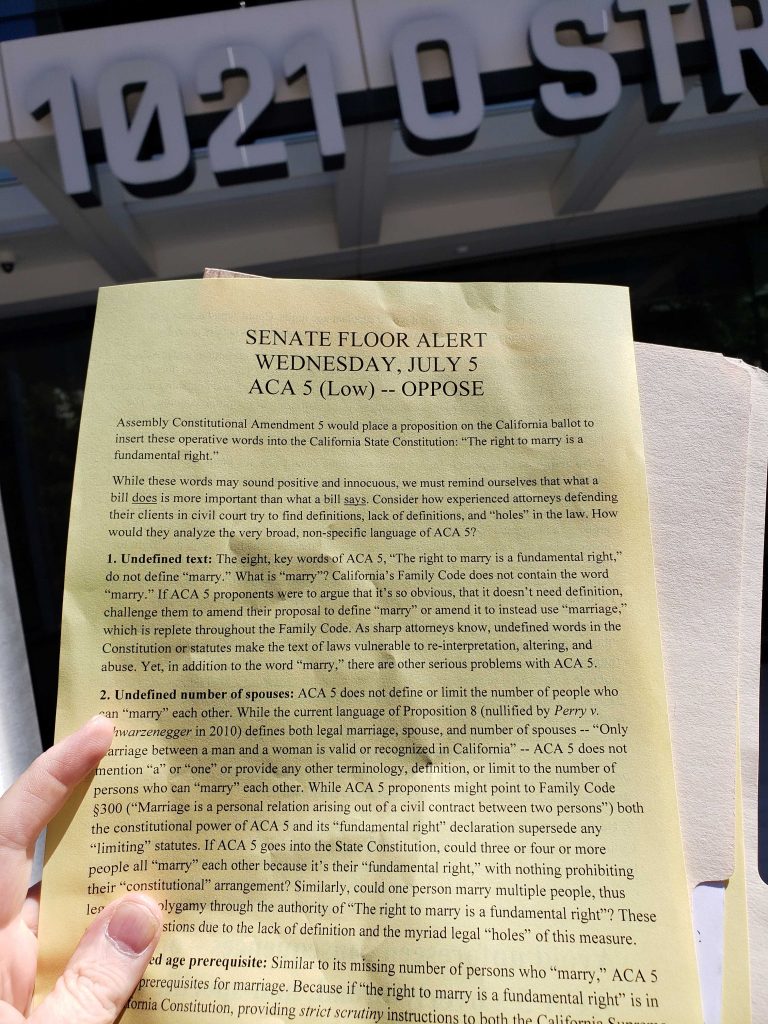
We’ve provided the eye-opening, horrible facts about ACA 5. And we’re empowering the calls you will make. Please call Sacramento now!
Our facts delivered to state senators about ACA 5 means there’s a greater chance to prevent it from passing. Because proposed constitutional amendments require a two-thirds vote (27 in the 40-member State Senate). And with 32 Democrats, ACA 5 can be defeated by the July 14 “summer recess” deadline if 6 Democrats don’t vote for it and neither do any of the 8 Republican senators.
Now that state senators know that ACA 5 would open up Pandora’s Box, they’ll know you know it’s bad too when you call. We need to a flood of calls right now exposing and opposing the radical ACA 5!
PLEASE TAKE ACTION TODAY:
STEP #1: Call your own California state senator anytime (find yours here). In your live phone call or recorded voicemail message, state your name, say you live in the district, give your voting address, and say, “Don’t you dare vote for the marriage anarchy of ACA 5. This radical measure opens the door to polygamy, child marriages, incestuous marriages, and more. ACA 5 is not about same-sex marriage, but about blowing up marriage boundaries. Vote NO.”
Step #2: Say the same when you leave anonymous voicemail messages 7pm to 8am for the following 8 Republicans and 21 deciding-vote Democrats:
8 Republicans:
Brian Dahle 916-651-4001 and 530-294-5000
Shannon Grove 916-651-4012 and 661-323-0443
Brian Jones 916-651-4040 and 619-596-3136
Janet Nguyen 916-651-4036 and 714-374-4000
Roger Niello 916-651-4006 and 916-464-3980 (ignorantly supported ACA 5 in committee)
Rosilicie Ochoa Bogh 916-651-4023 and 909-335-0271
Kelly Seyarto 916-651-4032 and 951-280-1260
Scott Wilk 916-651-4021 and 661-729-6232 (ignorantly supported ACA 5 in committee)
21 deciding-vote Democrats:
Benjamin Allen 916-651-4024 and 310-318-6994
Marie Alvarado-Gil 916-651-4004 and 916-933-8680
Bob Archuleta 916-651-4030 and 562-406-1001
Angelique Ashby 916-651-4008 and 916-651-1529
Catherine Blakespear 916-651-4038 and 760-642-0809
Anna Caballero 916-651-4014 and 559-264-3070
Bill Dodd 916-651-4003 and 707-224-1990
María Elena Durazo 916-651-4026 and 213-483-9300
Steve Glazer 916-651-4007 and 925-754-1461
Lena Gonzalez 916-651-4033 and 323-277-4560
Melissa Hurtado 916-651-4016 and 661-395-2620
Monique Limón 916-651-4019 and 805-988-1940
Dave Min 916-651-4037 and 949-223-5472
Steve Padilla 916-651-4018 and 760-335-3442
Anthony Portantino 916-651-4025 and 818-409-0400
Richard Roth 916-651-4031 and 951-680-6750
Susan Rubio 916-651-4022 and 909-469-1110
Lola Smallwood-Cuevas 916-651-4028 and 213-745-6656
Henry Stern 916-651-4027 and 818-876-3352
Tom Umberg 916-651-4034 and 714-558-3785
Aisha Wahab 916-651-4410 and 510-794-3900
ACA 5 FACTS DELIVERED TO REPUBLICAN AND DECIDING-VOTE DEMOCRAT STATE SENATORS
Assembly Constitutional Amendment 5 would place a proposition on the California ballot to insert these operative words into the California State Constitution: “The right to marry is a fundamental right.”
While these words may sound positive and innocuous, we must remind ourselves that what a bill does is more important than what a bill says. Consider how experienced attorneys defending their clients in civil court try to find definitions, lack of definitions, and “holes” in the law. How would they analyze the very broad, non-specific language of ACA 5?
1. Undefined text: The eight, key words of ACA 5, “The right to marry is a fundamental right,” do not define “marry.” What is “marry”? California’s Family Code does not contain the word “marry.” If ACA 5 proponents were to argue that it’s so obvious, that it doesn’t need definition, challenge them to amend their proposal to define “marry” or amend it to instead use “marriage,” which is replete throughout the Family Code. As sharp attorneys know, undefined words in the Constitution or statutes make the text of laws vulnerable to re-interpretation, altering, and abuse. Yet, in addition to the word “marry,” there are other serious problems with ACA 5.
2. Undefined number of spouses: ACA 5 does not define or limit the number of people who can “marry” each other. While the current language of Proposition 8 (nullified by Perry v. Schwarzenegger in 2010) defines both legal marriage, spouse, and number of spouses — “Only marriage between a man and a woman is valid or recognized in California” — ACA 5 does not mention “a” or “one” or provide any other terminology, definition, or limit to the number of persons who can “marry” each other. While ACA 5 proponents might point to Family Code §300 (“Marriage is a personal relation arising out of a civil contract between two persons”) both the constitutional power of ACA 5 and its “fundamental right” declaration supersede any “limiting” statutes. If ACA 5 goes into the State Constitution, could three or four or more people all “marry” each other because it’s their “fundamental right,” with nothing prohibiting their “constitutional” arrangement? Similarly, could one person marry multiple people, thus legalizing polygamy through the authority of “The right to marry is a fundamental right”? These are valid questions due to the lack of definition and the myriad legal “holes” of this measure.
3. Undefined age prerequisite: Similar to its missing number of persons who “marry,” ACA 5 lacks age prerequisites for marriage. Because if “the right to marry is a fundamental right” is in the California Constitution, providing strict scrutiny instructions to both the California Supreme Court and the U.S. Supreme Court, it would supplant age limits. Could “child marriages” become more commonplace under ACA 5? Without age standards, it’s legally plausible.
4. No prohibition of incestuous “marriages”: Following the above reasoning, under ACA 5, could fathers or mothers or children or siblings “marry” each other? This proposal doesn’t prohibit it. Even if ACA 5 proponents cite Penal Code §285 prohibiting and punishing incest, or other laws regulating relations of consanguinity, if the California Constitution contains “The right to marry is a fundamental right,” neither the Penal Code or the Family Code can usurp this higher legal standard. Therefore, ACA 5 could produce unexpected, unpopular consequences.
5. No definition of spouse: If ACA 5 pushes aside the Penal Code, the Family Code, and other statutes due to its powerful, hierarchical position in the California Constitution and its declared “fundamental right” status in both the state and federal courts, unimaginable results may become manifest. For example, since ACA 5 does not mention or define “spouse,” could one argue a “fundamental right” to “marry” an animal, an object, or even “themself”? Since ACA 5 never defines the persons (or objects) that can “marry,” the sky’s the limit, with the “right to marry” unassailable as part of the State’s supreme law of the land, amended by the People and expressing the will of the People. By being overly-broad and non-specific, is ACA 5 “opening Pandora’s Box”? This proposal challenges our common expectations of jurisprudence.
6. Constitutional “fundamental rights” trump other laws: Here is the legal impact of a “fundamental right,” as explained by the Legal Information Institute of Cornell Law School (https://www.law.cornell.edu/wex/fundamental_right): Fundamental rights are a group of rights that have been recognized by the Supreme Court as requiring a high degree of protection from government encroachment. These rights are specifically identified in the Constitution (especially in the Bill of Rights) or have been implied through interpretation of clauses, such as under Due Process. These laws are said to be “fundamental” because they were found to be so important for individual liberty that they should be beyond the reach of the political process, and therefore, they are enshrined in the Constitution. Laws encroaching on a fundamental right generally must pass strict scrutiny to be upheld as constitutional.
7. Unnecessary: Many supporters of same-sex marriage view ACA 5 as unnecessary, since the California State Constitution, Article 7.5 (Proposition 8 from 2008, stating, “Only marriage between a man and a woman is valid or recognized in California”) was nullified by both Perry v. Schwarzenegger in 2010 and Obergefell v. Hodges in 2015. Same-sex marriage is already legal, with gay and lesbian couples enjoying full legal status in all of California’s 58 counties.
Avoid unforeseen consequences – oppose ACA 5’s overly-broad, non-specific text




 RSS 2.0 Feed
RSS 2.0 Feed